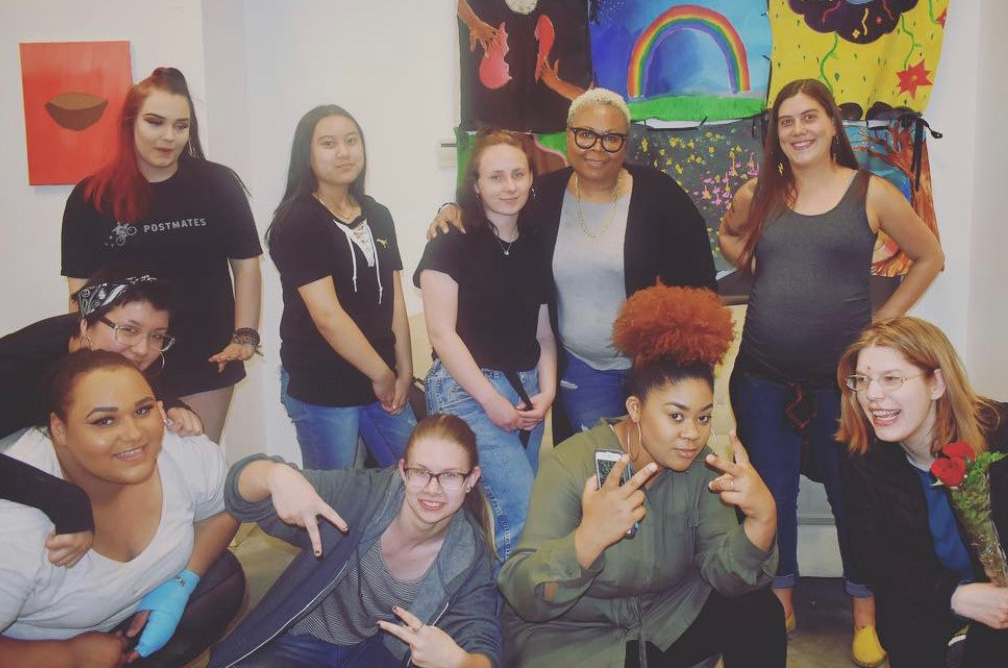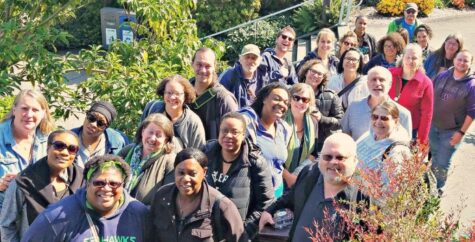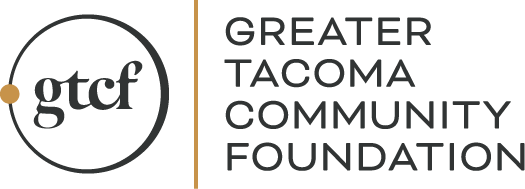
Community
12
Government Volume, Philanthropic Flexibility Ensure CARES Act Dollars Reach Pierce County Residents

IMAGE: Our Sisters House
Even with a massive infusion of federal dollars, getting money to those who need it most isn’t easy. When Pierce County received $158 million in CARES Act funding last summer, the money came with a tight deadline to get it out to the community: December 31, 2020.
Heather Moss, the director of Human Services in Pierce County, explains the challenge, “This was a significant amount of money to move through the government system in a short time, so we were learning and adjusting as time passed. In Human Services, unlike other departments, our work depends on people power to deliver services rather than procuring an item to meet a need. It is difficult to scale that people power capacity as quickly as the CARES timeframe required it to be done.”
The Human Services Department awarded local service providers approximately $32 million in federal CARES Act funded contracts to combat the effects of COVID-19. These providers included nonprofits, both large and small, serving a wide range of communities with things like rental assistance, motel vouchers, food, and childcare. One of those nonprofits was Our Sisters House (OSH).
It was difficult and often stressful telling clients they had to wait.
With a primary focus of serving the African American victims of domestic violence, under COVID-19 conditions OSH staff have had to scramble to find safe housing for victims who flee their abusers. Many people leaving domestic violence situations end up living in their cars, unable to go to with family members and friends due to public health social distancing measures and not wanting to be exposed to COVID-19.
Kelli Robinson, MBA, Executive Director of OSH, says the CARES Act funding supported, “motel stays to clients fleeing domestic violence and assisted with transportation with UBER Gift Cards.”
There was one big challenge for OSH, though. Pierce County government contracts with nonprofits are reimbursement-only, a restriction informed by Washington State’s Gift of Public Funds Doctrine. That means contracted service providers are reimbursed for actual expenses upon the receipt of invoices and proof of payment. A nonprofit must first spend the contracted amount before they can receive the payment for the expenses. To help nonprofits, Pierce County increased contactor reimbursement processing from monthly billing to 2-4 times per month. Even with that change, nonprofits struggle.
We had nearly emptied our reserves and had maxed out our line of credit.
Kelli Robinson points out the challenge that reimbursement-only contract structure poses for OSH, a very small organization, “we did not have the cash flow needed to pay for upfront costs of motel stays, the rent payments etc. So, we struggled in the beginning with waiting to be reimbursed for payments made. It would have been easier, faster turnaround in getting payments to clients, if even a portion of the funds had been frontloaded us. It was difficult and often stressful telling clients they had to wait.”
Even larger nonprofits struggled to meet the requirements of CARES Act funding reimbursement-only contracts. Michael Yoder, Executive Director of Associated Ministries, reveals the lengths they went to provide contracted services for people experiencing homelessness, “Associated Ministries had some limited funds in reserves and also access to a line of credit. We had nearly emptied our reserves and had maxed out our line of credit.”
Then, in August OnePierce Community Resiliency Fund, the investment arm of the health equity nonprofit Elevate Health, learned from nonprofit providers about their cash flow barriers to accessing CARES dollars. Lauren Fulton, Vice President of Impact Investing for OnePierce, says the problem fell under their mission, “We saw the opportunity and value in offering zero-interest bridge loans to bridge the gap created by the federal relief funds payment structure.”
Without this community’s responsiveness and quick actions, Pierce County would have left close to $1 million in dedicated basic needs funding on the table.
OnePierce approved up to $2.5M in zero-interest loans for the upfront funding of contracts reimbursed by County CARES Act dollars. These bridge loans would be repaid once the providers received CARES Act reimbursement for the services in their contracts. Lauren says OnePierce reached out to partners in the philanthropic community, “To allow for an abridged due diligence process and to mitigate risk to OnePierce funds that were not intended to carry risk in 2020, Greater Tacoma Community Foundation organized a philanthropic guaranty pool to underwrite the OnePierce loans.”
The Russell Family Foundation (TRFF) was one member of the guaranty pool. TRFF CEO Kathleen Simpson says, “The notion that a simple cash flow issue was preventing CARES Act funds from being deployed into the Pierce County Community, and that those funds had an expiration date of December 30th, 2020, was highly motivating to TRFF. Without this community’s responsiveness and quick actions, Pierce County would have left close to $1 million in dedicated basic needs funding on the table.”
the loans enabled the providers to draw down more of their CARES Act award
While philanthropy is most often associated with direct grant funding, Kathleen explains the sector can use a wide range of funding tools, “this CARES Act pooled fund offered us an opportunity to try out a new tool – a recoverable grant. The recoverable grant vehicle offered us the chance to meet an immediate and urgent community need along with our partners, while anticipating the opportunity to recycle that same capital back into future social impact projects.”
A total of eight organizations applied for and received bridge loans for a total of $847K. Funds were used primarily for eviction rental assistance; the rental assistance programs required large and rapid outlays of cash prior to reimbursement.
A OnePierce bridge loan program allowed OSH to take on eviction prevention and rental assistance. Kelli Robinson says OSH was, “able to pay rent for 66 families, spending a total of $156,000 in rent payments to residents, primarily African American residents of Pierce County.”
Based on monthly demographic data reported to Pierce County by the borrowers, Lauren Fulton says, “the full awards of the borrowers resulted in 1,295 households supported with rent assistance, 1,372 households supported for day camp for children of first responders and essential workers, and 990 behavioral health contacts with Pierce County residents. While these numbers are not fully attributable to the bridge loans, the loans enabled the providers to draw down more of their CARES Act award and therefore supported these outputs.”
As long as funds are awarded to nonprofits on a reimbursement basis, the ability for our nonprofit partners to meet urgent needs will be constrained.
Although the bridge loans provided critical assistance, they are not a complete solution to nonprofit challenges with reimbursement-only contracts. Michael Yoder says that even with the bridge loan Associated Ministries, “had to borrow against our endowment funds in order to have adequate operating cash to expend as much of the CARES funds as possible. If we had been front-funded, we could have taken on a much larger amount of the CARES funding and helped Pierce County fully expend the federal funds it was awarded. As it was, we had to limit the amount of CARES funds we could accept.”

IMAGE: Associated Ministries
More federal funding will come to Pierce County in 2021 to address COVID-19 conditions. Lessons from the bridge loan pool could support even stronger, more responsive funding solutions.
It was also amazing to see agencies come together to support each other and how the County worked with us as our funds ran out and made sure we were able to assist all our clients before the contract period ended.
Lauren Fulton says, “If there were a way for the County or other entities to structure the federal relief funds differently so they could be disbursed upfront, additional bridge loans would not be needed.” Kathleen Simpson suggests, “As long as funds are awarded to nonprofits on a reimbursement basis, the ability for our nonprofit partners to meet urgent needs will be constrained.”
Another member of the bridge loan guaranty pool, Cory Sbarbaro, Executive Vice President of Group Health Foundation, points out the need for a larger approach to the issue, “Philanthropy can be an important supporter and incubator in this moment – even a nimble one – but philanthropic dollars will always be a small fraction of funding relative to the public sector. The reality is that the impact of the pandemic, and the extent to which the recovery is equitable, will largely be determined by government funding, priorities, and approaches.”
As a nonprofit service provider, Kelli Robinson also learned valuable lessons, “This was my first experience with invoicing and so I learned quickly the importance of keeping good records, paying attention to details, the accounting process of local county government and how to be prepared and flexible as things can change with little to no notice. It was also amazing to see agencies come together to support each other and how the County worked with us as our funds ran out and made sure we were able to assist all our clients before the contract period ended.”
The government sector brought volume, and the philanthropic sector brought flexibility
Despite the tight timeline, Pierce County did expend all the CARES Act funding before the December 31, 2020 deadline. As of February 8, 2021, 96 percent of the bridge loans were repaid in full to OnePierce with the remaining organizations in good standing and on track for repayment. Trusted relationships across funders, agencies, and organizations supported more effective funding models, planning, and contracts to better serve our communities.
Heather Moss reflects, “A public-private partnership like this is unique for us in Human Services. What I love about Pierce County, is that the community is small enough we have personal relationships across sectors involved in solutions, yet our community is big enough to have established systems in place to accomplish work quickly.
“The philanthropic sector was able to step in with services and cash that had greater flexibility to meet an operational need the government money, due to public funding restrictions, could not address. The government sector brought volume, and the philanthropic sector brought flexibility; neither entity could have done what we did to move a significant amount of money and support services through our community without the other.”
FURTHER READING
Pierce County CARES Act Funding Financial Report
Gift of Public Funds and COVID-19
OnePierce Community Resiliency Fund Backs CARES Act Funding with $2.5M in Bridge Loans
Washington Counties Struggle to Obtain Federal Funds for Homeless, While Thousands Remain on Streets






